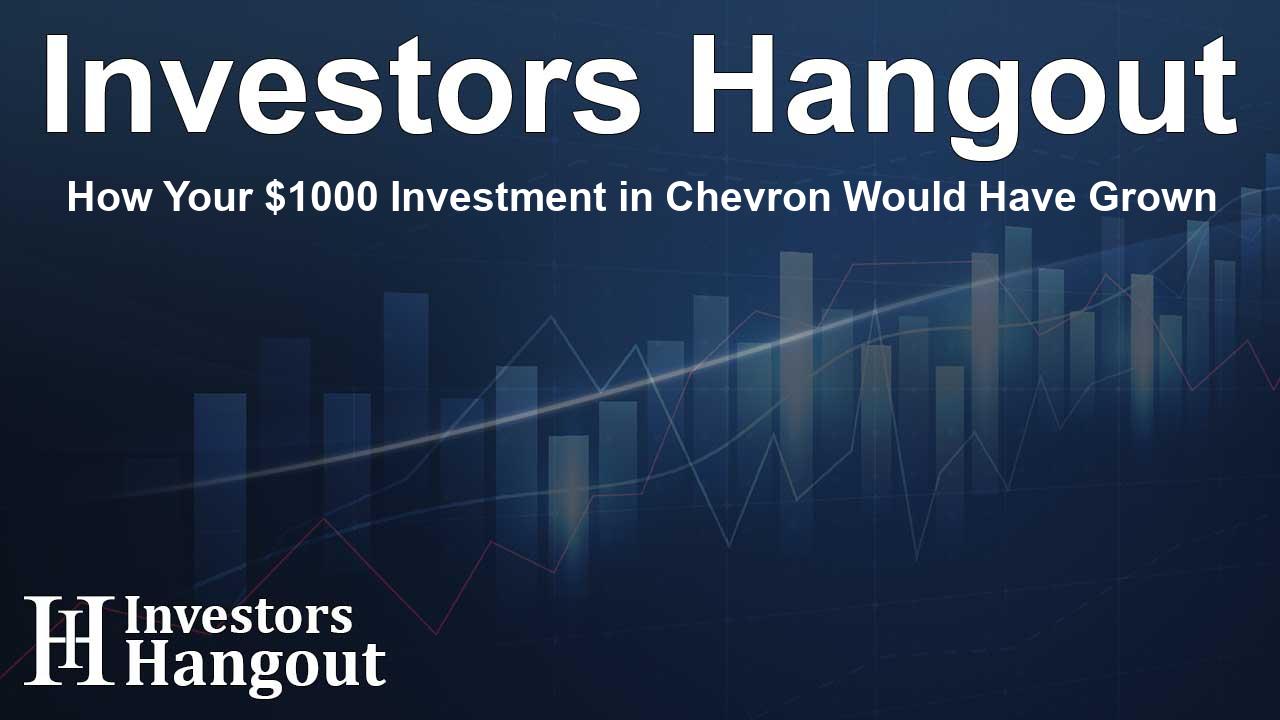How Your $1000 Investment in Chevron Would Have Grown

Understanding Chevron's Impressive Growth
Chevron Corporation (NYSE: CVX) has demonstrated remarkable performance over the past five years, surpassing market expectations with an annualized return of 15.94%. As of now, Chevron boasts a market capitalization of approximately $312.71 billion, further establishing itself as a significant player within the energy sector.
Investing $1000 in Chevron Stock
Consider this: if an investor had committed $1000 to Chevron shares five years ago, that amount would have grown to a staggering $2,063.35 today. This remarkable increase reflects the current share price of $153.80 for CVX, highlighting the potential of high-performing investments.
The Importance of Compounded Returns
What's critical to take away from this scenario is the effect of compounded returns on an investment over time. Compounding can significantly amplify the growth of an investment, showcasing how even small investments can lead to substantial financial outcomes.
Chevron's Business Strategy
The company's business strategy comprises a blend of traditional and innovative practices. Chevron is focused on maximizing shareholder value while navigating the fluctuating demands of the global energy market. This dual approach has proven effective, helping the company to thrive amidst competition and economic shifts.
Future Outlook for Chevron
Looking ahead, Chevron’s strategic emphasis on sustainability and operational efficiency positions the company to leverage future growth opportunities. As the world increasingly embraces green energy, Chevron's investments in cleaner technologies may yield positive outcomes in both environmental and financial terms.
Key Takeaways About Chevron's Investment Potential
Investing in established companies like Chevron can often lead to favorable results, especially when considering long-term growth prospects. Chevron's consistent performance makes it an attractive option for those looking to understand the dynamics of investing in the energy sector.
Conclusion
In summary, the impressive growth of an initial $1000 investment in Chevron illustrates the potential gains that can result from prudent investments in successful companies. The power of compound interest cannot be underestimated, and Chevron's ongoing strategies suggest it may continue to be a viable investment choice moving forward.
Frequently Asked Questions
What is Chevron's stock performance over the last five years?
Chevron has outperformed the market with an annualized return of 15.94% over the past five years.
If I invested $1000 in Chevron five years ago, what would it be worth now?
That $1000 investment would now be worth about $2,063.35, reflecting significant growth.
Why is compounding important in investing?
Compounding significantly increases the value of investments over time, allowing earnings to generate additional earnings.
What strategies does Chevron use to maintain its growth?
Chevron adopts a blend of traditional and innovative practices, focusing on maximizing shareholder value and navigating market demands.
What is the future outlook for Chevron?
Chevron's focus on sustainability and operational efficiency positions it well for continued growth, especially in the evolving energy market.
About The Author
Contact Caleb Price privately here. Or send an email with ATTN: Caleb Price as the subject to contact@investorshangout.com.
About Investors Hangout
Investors Hangout is a leading online stock forum for financial discussion and learning, offering a wide range of free tools and resources. It draws in traders of all levels, who exchange market knowledge, investigate trading tactics, and keep an eye on industry developments in real time. Featuring financial articles, stock message boards, quotes, charts, company profiles, and live news updates. Through cooperative learning and a wealth of informational resources, it helps users from novices creating their first portfolios to experts honing their techniques. Join Investors Hangout today: https://investorshangout.com/
The content of this article is based on factual, publicly available information and does not represent legal, financial, or investment advice. Investors Hangout does not offer financial advice, and the author is not a licensed financial advisor. Consult a qualified advisor before making any financial or investment decisions based on this article. This article should not be considered advice to purchase, sell, or hold any securities or other investments. If any of the material provided here is inaccurate, please contact us for corrections.
